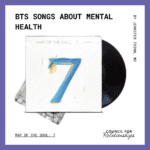4 Mental Health Lessons from BTS’s Map of the Soul: 7
We can draw many mental health lessons from BTS’s vast music catalog. While the South Korean band is on hiatus, we reflect on the 4 mental health lessons from BTS’s Map of the Soul: 7 (with a special assist by Doolset Lyrics for the Korean-to-English translations of BTS’s lyrics).
 Important Mental Health Lessons from BTS’s Map of the Soul: 7 for Everyday Life
Important Mental Health Lessons from BTS’s Map of the Soul: 7 for Everyday Life
You may know BTS from their COVID pandemic era hits “Dynamite,” “Butter,” and “Permission to Dance,” which provided light-hearted comfort and joy during an unsettling time of lockdown and widespread illness. As The Atlantic writer Lenika Cruz aptly summarized in her 2020 article, “…nearly every BTS song seeks, in some way, to assure the listener: You are not alone.”
While the BTS members take a break from group activities to complete mandatory South Korean military service, we can learn mental health lessons from their 2020 studio album Map of the Soul: 7.
Map of the Soul: 7 is a follow-up to their 2019 EP, Map of the Soul: Persona. Both albums draw inspiration from Swiss psychiatrist and psychoanalyst Carl Jung’s concept of the Map of the Soul. Swiss training analyst Dr. Murray Stein 1998 book Jung’s Map of the Soul: An Introduction was featured on BTS’s management company Big Hit Entertainment’s (now HYBE) website.
Map of the Soul: 7 touches upon introspection, self-examination, and self-acceptance themes. As band member Suga explained in an interview, “One message that penetrates the album as a whole is that you must face your inner shadow but resist becoming submerged into its depths.”
Mental Health Lesson #1: “Intro: Persona”
“Intro: Persona” is a song by RM, the leader of BTS, about self-discovery. He opens the song with the lines:
“Who am I?” the question I had my whole life
The question which I probably won’t find an answer to my whole life
Carl Jung described the persona as “a complicated system of relations between the individual consciousness and society, fittingly enough a kind of mask, designed on the one hand to make a definite impression upon others, and, on the other, to conceal the true nature of the individual.” In Analytical Psychology, the persona is a sort of social mask that we wear when interacting with the outer world. That mask is how we appear to others and how we wish to be perceived by them. We can have various personae throughout life.
My shadow, I named him “hesitation” and called him
Once he became it, he has never hesitated
Whether it is under the stage or under the light, he keeps appearing
And stares at me fiercely like heat haze (Oh sh*t)
Throughout the video, RM confronts various representations of himself, just as one may do during psychotherapy. In the first half of the song, he asks introspective questions about his life and flaws and, in the latter half, resolves to embrace his qualities.
In addition to the lyrics, the music video incorporates vocal samples and visual references to a prior song, “Intro: Skool Luv Affair,” as additional nods to past reflection and self-examination. This song acknowledges that we do not exist in a vacuum–that the human experience is messy and complicated and an amalgam of our experiences, present actions, and future hopes and fears.
Mental Health Lesson #2: “Boy With Luv (feat. Halsey)”
The Korean title, 작은 것들을 위한 시, means “A Poem for Small Things.”
When asked about the meaning of the song, BTS’s leader, RM, references “ARMY” (also known as BTS’s fandom) and describes the song as being “about finding little joy in love, being curious about the little things, the details like what you’re eating, what you’re doing. But, most importantly, Boy With Luv is like a fan letter from BTS to ARMY. That’s the most important thing.”
This song can be seen as a transformation from their 2014 song “Boy In Luv,” which portrays love as immature enamor from a macho perspective to the more mature, reflective, and nuanced type of love.
This track teaches us about the splendor in life’s small, ordinary details, like noticing your plant growing a new leaf on the windowsill, when someone remembers just how you like your coffee/tea, or breathing in that unique earthy smell after a light summer rain. In relationships, acknowledging and enjoying the mundane details together can be just as important as grand, exciting gestures.
I’ll just talk straight and honest
There were times when I was acting arrogant without knowing
The sky that became too high, the hall that became too big
Sometimes I prayed to let me run away
But your scar is my scar–
When I realized it, I promised myself
That, with Icarus’ wings that you gave me,
I’d fly to you, not the sun
Let me fly
With the Icarus’ wings reference, we can learn to course correct (and be grounded in a realistic and healthy loving relationship) rather than fly too close to the sun (and be consumed by fantasies of what we hope to gain from being in love) and crash.
Mental Health Lesson #3: “Jamais Vu”
Jamais vu is a French term meaning “never seen” that describes the uncanny impression of experiencing something for the first time despite logically knowing that one has experienced it before. This unfamiliar feeling is sometimes associated with certain types of aphasia, amnesia, and epileptic events and can occur with familiar words, phrases, people, places, and events.
Jamais vu is often explained as the opposite of déjà vu (the sensation that an event has already been experienced in the past, whether it actually occurred or not).
This track is about stumbling into repetitive patterns and failing to learn from our mistakes. We may subconsciously repeat the same maladaptive patterns throughout our lives. One of the goals of psychotherapy can be to bring awareness to these behaviors and gain understanding (as they may have been protective in the past but are no longer serving our present selves). With greater insight, there is hope for change.
I feel like I’ve lost again
You look angry
A sign that glimmers, “Game over, over, over”
If this was a game,
It would be all good if I load it again
I guess I gotta deal with this, deal with this
Real world
…
Though I’m okay, I’m not okay
Though I’ve been telling myself that I’m used to this,
It hurts every time as if it’s the first time
Mental Health Lesson #4: “00:00 (Zero O’Clock)”
“Zero O’Clock” is a comforting and candid song that opens with depictions of the heaviness and loneliness of depression. The lyrics describe staying awake in bed, replaying past events, and ruminating on self-blame. The song’s crux imagines midnight as the time when the “world holds its breath” and the day can reset. It provides an encouraging message of hope: tomorrow is a new day and a chance to start anew.
There are those days
Days when you’re sad for no reason,
When your body feels heavy,
And everyone, except me,
Looks busy, fiercely living their life
I can’t get my feet to move
Though it feels like I’m already late
The whole world disturbs me.
…
I come home
Lie in bed
And try thinking
Whether it was my fault
An unsettling night,
Suddenly, I look at the clock
Soon, it’s 12 O’Clock
Will something change
It probably won’t be the case
But still, this day
Will end
When the second hand and the minute hand overlap,
The world holds it breath for a very brief moment
Zero O’Clock
And you gonna be happy
And you gonna be happy

Philadelphia Psychiatrist and Therapist Dr. Jennifer Trinh
About CFR Staff Psychiatrist Dr. Jennifer Trinh
Jennifer Trinh, MD, is a Staff Psychiatrist at Council for Relationships. Contact her to book an appointment or schedule a referral.
Let CFR’s over 85 individual, couples, and family therapy experts help you build thriving relationships and flourishing communities. See our Therapist & Psychiatrist Directory for CFR therapists or psychiatrists near you.
If this is an emergency, please call 911 or contact the National Suicide Prevention Lifeline by dialing 988.
More Mental Health Blogs
Our expert therapists, psychologists, and psychiatrists offer much more to explore! Check out the CFR Expert Voices blog for great mental and emotional health advice and insight. To get first access to our Expert Voices blog, join our mailing list!
Closing the Gap: Perinatal Mental Health Services in North Philadelphia
